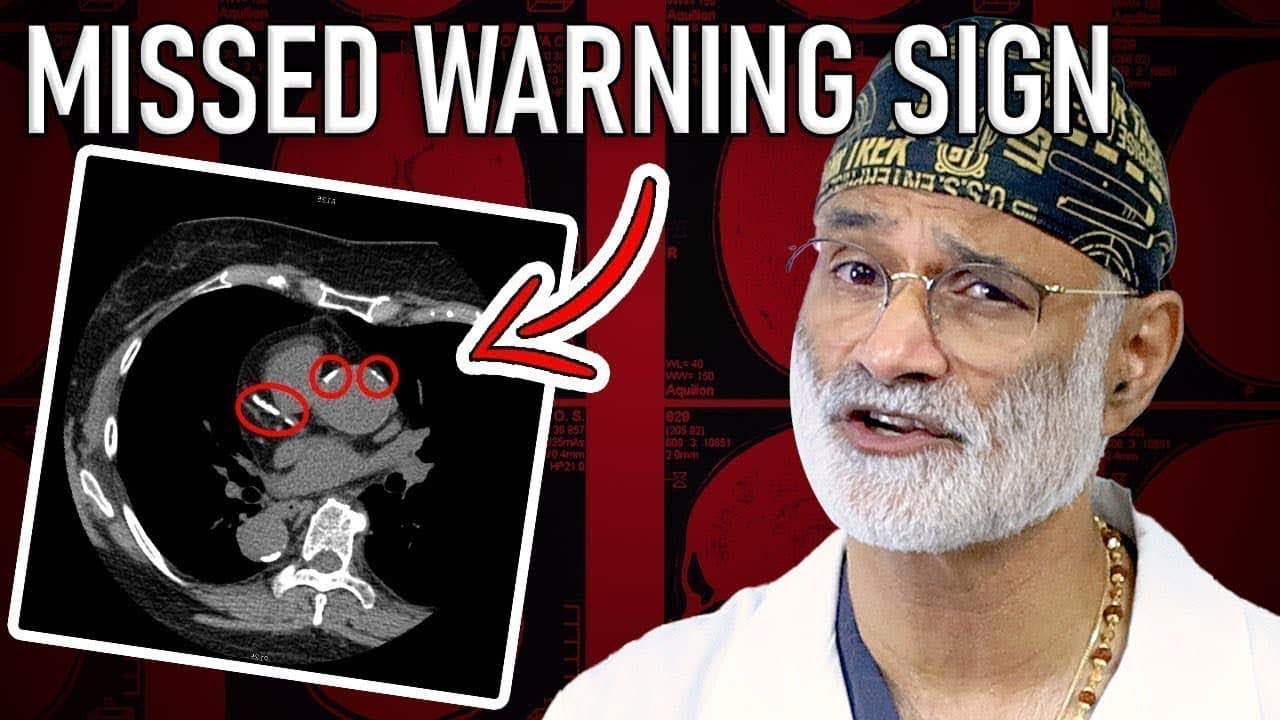*****
Summary of Transcript:
Dr. Jamnadas discusses the issue of incomplete cardiac examination in patients. He explains that most heart attacks are silent, and symptoms like chest pain are absent. Ischemia, a lack of circulation, is often quiet and can occur even when patients are physically active. Therefore, stress tests are only useful in detecting blockages greater than 70% because minor blockages that may cause heart attacks do not restrict blood flow. The amount of plaque present increases the risk of a heart attack, and it is important to detect these blockages before they rupture and cause a heart attack. o see these minor blockages and the amount of plaque in the coronary arteries, coronary calcium scores should be conducted, which involve a C.T. scan.
*****
Summary of Description:
Dr. Pradip Jamnadas explains in this video that an incomplete cardiac examination is becoming common among patients. In evaluating cardiovascular disease, a coronary calcium score and a metabolic syndrome workup are important in addition to the traditional workup of a stress test, echocardiogram, and routine lipid blood tests. Knowing the risk factors and whether one has coronary calcium allows lifestyle changes and dietary interventions to stabilize plaque.
*****
The Importance of a Complete Cardiac Examination: Understanding Coronary Calcium Score and Metabolic Syndrome Workup
Introduction
Cardiovascular disease is one of the leading causes of death worldwide. Most people don’t know they have cardiovascular disease because heart attacks and Ischemia can be silent. In this video, Dr. Pradip Jamnadas, founder and Chief Medical Officer of Cardiovascular Interventions, P.A. in Orlando, Florida, explains why traditional workup is insufficient for an accurate cardiac examination.
Most Heart Attacks are Silent
Dr. Jamnadas explains that most heart attacks are silent, meaning they happen without warning signs. Patients can only know their cardiovascular risk factors by understanding their medical history, performing routine laboratory tests, and completing a cardiac examination.
Ischemia is Silent
Even more alarming than a silent heart attack is Ischemia, which is also quiet. Ischemia is the reduced blood supply to the heart muscle, which can cause chest pain, fatigue, and shortness of breath. However, in some cases, patients can experience silent Ischemia, which can only be detected through a complete cardiac examination.
What Happens When You Have a Blockage?
When there is a blockage in the coronary arteries, the heart muscle does not receive enough blood flow, resulting in damage to the heart muscle. The damage can range from mild to severe, depending on the amount of blockage and the duration of the reduced blood supply.
What a Stress Test Tells You
A stress test is a test that is used to evaluate the Heart’s response to exercise. A stress test can detect heart disease, but it is not always reliable. A stress test can miss some heart problems, such as blockages in the coronary arteries that do not cause chest pain.
Blockages of Less Than 70% are Still Dangerous.
Dr. Jamnadas emphasizes that blockages in coronary arteries of less than 70% can still cause a heart attack, stroke, or sudden cardiac death. Therefore, patients need a complete cardiac examination to evaluate their cardiovascular risk factors accurately.
A Coronary Calcium Score Shows Plaque Buildup
A coronary calcium score is a non-invasive test that measures the amount of calcium in the coronary arteries. Calcium deposits are a sign of plaque buildup, which can cause blockages in the coronary arteries. Patients with a higher calcium score are at a greater risk of heart disease and must take appropriate preventive measures.
A Metabolic Workup is Needed to Stabilize Plaque
A metabolic workup is a blood test that evaluates the patient’s metabolic profile. The metabolic profile includes blood sugar, cholesterol, and triglyceride levels. A metabolic workup is important because it can identify patients at a higher risk of coronary artery disease and help them take preventive measures.
What We Did in the Past is Incomplete
Knowing whether you have coronary calcium and risk factors allows potent lifestyle changes and dietary interventions. The traditional workup of a stress test, echocardiogram, and routine lipid blood tests is inadequate for a complete cardiac examination. Dr. Jamnadas emphasizes the importance of a coronary calcium score, a heart scan, and a metabolic syndrome workup in evaluating cardiovascular disease.
Outro
In conclusion, a complete cardiac examination is necessary to accurately evaluate a patient’s cardiovascular risk factors. The traditional workup of a stress test, echocardiogram, and routine lipid blood tests is inadequate for a complete cardiac examination. Patients must undergo a coronary calcium score and a metabolic syndrome workup to evaluate their cardiovascular risk factors accurately. This information can help patients make lifestyle changes and dietary interventions that lead to a healthier life.
*****
Source Description
In this video, I will explain that many patients are getting incomplete cardiac examinations today. A coronary calcium score, also known as a heart scan, is vitally important and a metabolic syndrome workup in evaluating cardiovascular disease. The traditional workup of a stress test, echocardiogram, and routine lipid blood tests is an inadequate cardiac examination. Knowing whether you have coronary calcium and risk factors allows potent lifestyle changes and dietary interventions.
0:00 Intro
0:50 Most heart attacks are silent
1:33 Ischemia is silent
2:00 What happens when you have a blockage
3:20 What a Stress test tells you
4:35 Blockages less than 70% are still dangerous
6:40 A coronary calcium score shows plaque buildup
8:55 A metabolic workup is needed to stabilize plaque
10:50 What we did in the past is incomplete
12:03 Outro
Subscribe to the Channel!
https://www.youtube.com/channel/UCOtQHehGWtblMp1gZC8Kq3Q?sub_confirmation=1
Sign up for my Heart Health emails
My other Videos:
What is a Coronary Calcium Score? – https://youtu.be/NYkW2vxyioc
What is a C.T. Angiogram (CTA) of the Heart? – https://youtu.be/uHpN1FQ-Hvo
What is Cardioversion? – https://youtu.be/yb-srtyEOuY
What is a Leadless Pacemaker? – https://youtu.be/2CYZbeYSvVE
What is Right Heart Catheterization? – https://youtu.be/2hy05-dM-lM
What is a Heart Attack? – https://youtu.be/lPzT62_b4Ko
Heart Attack Treatment – https://youtu.be/N0vFV3wOGPU
What is a Kraft Test? – https://youtu.be/SxS2AayOHmo
What is an Echocardiogram? – https://youtu.be/DZ3G8P0L_sM
Monitoring Heart Failure with CardioMEMS – https://youtu.be/A35IsJxs6mw
Introduction to Cardiac Catheterizations – https://youtu.be/k4UyUBGnojU
What is a Loop Recorder? – https://youtu.be/mXHAuV27bs8
External Counterpulsation (ECP) for Chest Pain and Coronary Calcium – https://youtu.be/4wd-3WyvlNQ
My Lectures:
“The Fat Lies” – https://youtu.be/Yo-IL-LH5FQ
“The Bittersweet Truth” – https://youtu.be/6zZBiTfIp4Q
Social Links:
https://www.facebook.com/orlandocvi
https://www.instagram.com/pradipjamnadasmd/
https://www.facebook.com/pradipjamnadasmd/
About Dr. Pradip Jamnadas, MD, MBBS, FACC, FSCAI, FCCP, FACP
The founder and Chief Medical Officer of Cardiovascular Interventions, P.A. in Orlando, Florida, where, since 1990, he has been repeatedly recognized in local publications as a Top Doctor performing thousands of interventional procedures in the hospital and outpatient settings. As a consultant cardiologist with a large diversified inpatient and outpatient practice, he is noted for his passion for teaching and illuminating prevention for cardiovascular disease. He is also a clinical assistant professor of medicine at Florida State University and the University of Central Florida.
▬▬▬▬▬▬▬▬▬▬▬▬▬▬▬▬▬▬▬▬▬▬▬▬
Myocardial infarction animation – Coronary arteries Anatomy! Blood supply of Heart! Arterial supply of Heart! Animation -1080 X 19 by MetaLife
https://www.youtube.com/watch?v=lJfrZRILY4M
Licensed under CC Attribution 3.0 – https://creativecommons.org/licenses/by/3.0/legalcode
This work has been modified
Music: Space Technologies by MaxKoMusic
Video Link: https://youtu.be/KDLPDukQqBI
▬▬▬▬▬▬▬▬▬▬▬▬▬▬▬▬▬▬▬▬▬▬▬▬
Disclaimer: The information provided is for general knowledge and is not a substitute for individual medical advice. All viewers should consult their physician before starting any medical program or treatment. Any action you take upon the information you find within this content is strictly at your own risk. Neither Dr. Pradip Jamnadas nor Cardiovascular Interventions will be liable for any damages or losses in connection with the content on this YouTube Channel.



Comments are closed